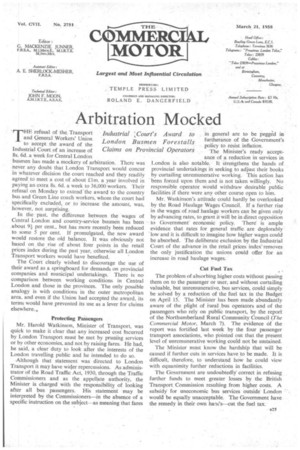Arbitration Mocked
Page 29

If you've noticed an error in this article please click here to report it so we can fix it.
'THE refusal of the Transport and °metal Workers' Union to accept the award of the Industrial Court of an increase of 8s. 6d. a week for Central London busmen has made a mockery of arbitration. There was never any doubt that London Transport would concur in whatever decision the court reached and they readily agreed to meet a cost of about Elm, a year involved in paying an extra 8s. 6d. a week to 36,000 workers. Their refusal on Monday to extend the award to the country bus and Green Line coach workers, whom the court had Specifically excluded, or to increase the amount, was, however, not surprising.
In the past, the difference between the wages of Central London and country-service busmen has been about 94 per cent., but has more recently been reduced to some 5 per cent. If promulgated, the new award would restore the old balance. It was obviously not based on the .rise of about four points in the retail prices index during the past year, otherwise all London Transport workers would have benefited.
The Court clearly wished to discourage the use of their award as a springboard for demands on provincial companies and municipal undertakings. There is no comparison between working conditions in Central London and those in the provinces. The only possible analogy is with conditions in the outer metropolitan area, and even if the Union had accepted the award, its terms would have prevented its use as a lever for claims elsewhere., Protecting Passengers Mr. Harold Watkinson, Minister of Transport, was quick to make it clear that any increased cost tncurred by London Transport must be met by pruning services or by other economies, and not by raising fares. He had, he said, a clear duty to look after the interests of the London travelling public and he intended to do so.
-Although that statement was directed to London Transport it may have wicler repercussions. As administrator of the Road Traffic Act, 1930, through the Traffic Commissioners and as the appellate authority, the Minister is charged with the responsibility of looking after all bus passengers. His statement may be interpreted by the Commissioners—in the absence of a specific instruction on the subject—as meaning that fares in general are to he pegged in furtherance of the Government's policy to resist inflation.
The Minister's ready acceptance of a reduction in services in London is also notable. It strengthens the hands of provincial undertakings in seeking to adjust their books by curtailing unremunerative working. This action has been forced upon them and is not taken willingly. No responsible operator would withdraw desirable public facilities if there were any other course open to him.
Mr. Watkinson's attitude could hardly be overlooked by the Road Haulage Wages Council. If a further rise in the wages of road haulage workers can be given only by advancing rates, to grant it will be in direct opposition to Government' econ.omic policy. There is ample evidence that rates for general traffic are deplorably• low and it is difficult to imagine how higher wages could be absorbed. The deliberate exclusion by the Industrial Court of the advance in the retail prices index' removes the only justification the unions could offer for an increase in road haulage wages.
Cut Fuel Tax The problem of absorbing higher costs without passing them on to the passenger or user, and without curtailing valuable, but unremunerative, bus services, could simply be solved by a reduction of the fuel tax in the Budget on April 15. The Minister has been made abundantly aware of the plight of rural bus operators and of the passengers who rely on public transport, by the report of the Northumberland Rural Community Council (The Commercial Motor, March 7). The evidence of the report was fortified last week by the four passenger transport associations, who pointed out that the present level of unremunerative working could not be sustained.
The Minister must know the hardship that will be caused if further cuts in services have to be made. It is difficult, therefore, to understand how he could view with equanimity further reductions in facilities.
The Government are undoubtedlY correct in refusing further funds to meet greater losses by the British Transport Commission resulting from higher costs. A subsidy for uneconomic bus services outside London would be equally unacceptable. The Government have the remedy in their own hanes--cut the fuel tax.








































































































